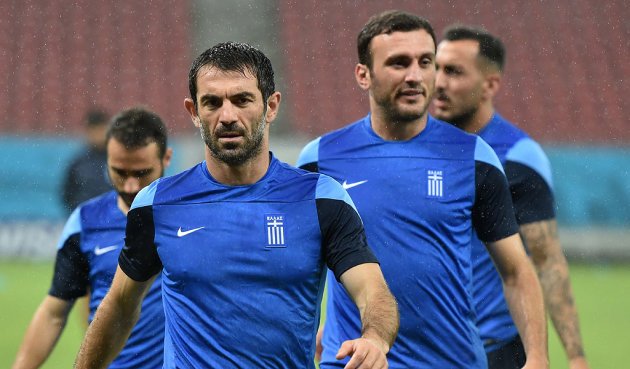Boko Haram's campaign of violence in Nigeria recently became a focus of international attention when it kidnapped more than 200 schoolgirls. In their former stronghold of Maiduguri militants have been forced out. But the BBC had a journalist go undercover in the city for his, and his interviewees' safety, and he found residents living in fear.
With a machete in one hand and a stick in the other, an agitated teenager flags us down, pushing his head through the window and quickly scanning the car.
He is manning one of hundreds of checkpoints across Maiduguri, the capital of the north-eastern Nigerian state of Borno, and is a member of a civilian militia known as the Joint Task Force (JTF) guarding the city.
Maiduguri was once the bustling commercial hub of the north-east. Traders arrived from all over Nigeria and from neighbouring countries, bearing goods such as car parts and building materials and taking away cattle and cat fish.
Continue reading the main story
“Start Quote
Our greatest worry is for the people in the villages, who are being killed like ants”
Maiduguri resident
But Borno state - the "Home of Peace" as its outdated motto goes - lost its innocence in 2009, when Boko Haram launched military operations to create an Islamic state.
The past five years have been the most tumultuous in Maiduguri's history.
On the back foot in 2010, Boko Haram regrouped to organise a flurry of bombings and drive-by shootings here.
Two years ago, its fighters roamed freely in the streets. People were torn between risking reprisals for reporting them, and being accused of collaboration by the army if they stayed silent.
Fed up with what it saw as government inaction, last year the civilian JTF eventually went house to house, rooting the militants out.
The city is now gradually picking up the pieces, and some of those who had fled have started returning. "We thank God for current peace and we hope it lasts," says a 49-year-old welder.
Yalda Hakim investigates Abubakar Shekau, the man behind Boko Haram
But that peace seems fragile and both the people and the army know it. Boko Haram's leader, Abubakar Shekau, has declared war on all Maiduguri residents, especially members of the JTF.
In many ways, Maiduguri now looks like an island unto itself.
Almost all other parts of Borno are exposed, and villages on the fringes of the city get attacked frequently.
'Hopeless'
Continue reading the main story
Find out more
Watch Our World: Nigeria Undercover on BBC World News from 20:30 GMT on Friday
"Our greatest worry is for the people in the villages, who are being killed like ants - innocent people who are being murdered day and night," says the welder, who like others asked not to be named for fear of reprisals by Boko Haram or the army.
The UN estimates that 650,000 people have been displaced by the Boko Haram crisis, and there has been a steady stream flocking to Maiduguri.
"We are hopeless," says one man who took refuge at an uncle's house in the city with his wife and seven children. "The attackers burnt our village and killed many people."
Commercial airlines have yet to resume flights to Maiduguri since the airport was attacked in December, and almost all roads to the city are under Boko Haram control.
Continue reading the main story
“Start Quote
When we see Boko Haram and we tell the army, they will say, 'we can't do anything'”
Truck driver
The only "safe route" has also become too dangerous to travel as militants can block it at will, slaughtering travellers and looting trucks.
Many truck drivers would rather keep away from Maiduguri. "If we come across Boko Haram, they will burn our trucks and kill us," says one. He has been transporting goods to Mubi in Adamawa state for more than 20 years.
But Boko Haram controls the normal route, and the detour takes him through Chibok - where the schoolgirls were kidnapped in April - and other places of risk along the way.
Boko Haram at a glance
- Founded in 2002
- Initially focused on opposing Western education - Boko Haram means "Western education is forbidden" in the Hausa language
- Launched military operations in 2009 to create Islamic state
- Thousands killed, mostly in north-eastern Nigeria - but also attacks on police and UN headquarters in capital, Abuja
- Some three million people affected
- Declared terrorist group by US in 2013
The army does little to help, the driver says. "When we see Boko Haram in their [Toyota] Hilux jeeps and we tell the army, they will say: 'We can't do anything, wait for them to leave.'"
A businessman who used to send at least 10 trucks to Chad each month now barely manages to send two. Lorry drivers are killed and their goods are looted.
The army is encircling the city with trenches and mud walls, heightening the sense of siege.
There are also fears of infiltration.
"These trenches cannot provide any real defence," says a local historian and commentator. "In our case, the enemy can enter the fortress and attack from within."
Because of the state of emergency in Borno and the neighbouring states of Yobe and Adamawa, there is a strict 06:00 to 21:00 curfew.
Businesses have to meet the strict deadline and this has resulted in a huge loss of revenue.
Plunge in enrolment
Students are suffering too.
True to its name, which means "Western education is forbidden" in the Hausa language, Boko Haram has killed many teachers and burnt schools they accuse of promoting anti-Islamic values.
Almost all public schools in Borno have closed, except for a handful in Maiduguri.
Applications for places in the local university have dropped from 25,000 for 2012-2013 to fewer than 4,000 a year later, according to one lecturer.
The militants have so far spared Islamic schools, or madrassas.
But the children at one state-run madrassa said they were still fearful of being kidnapped or attacked by armed gunmen.
The government has made bold declarations about ending the crisis.
But some soldiers have complained that they are not properly equipped to face the insurgents, and one civilian JTF member said he thought the army was keen to avoid a face-to-face confrontation.
When the security forces have moved against the militants, they have been accused of repeated human rights violations - accusations the government has either denied or not responded to.
With the case of the kidnapped schoolgirls unresolved, the credibility of the government and the military is at an all-time low. Many in Maiduguri feel the authorities do not have the will, let alone the means, to take on the insurgency.
That leaves the residents fearful that Boko Haram could return at any time to exact revenge.











 Deadliest phase
Deadliest phase